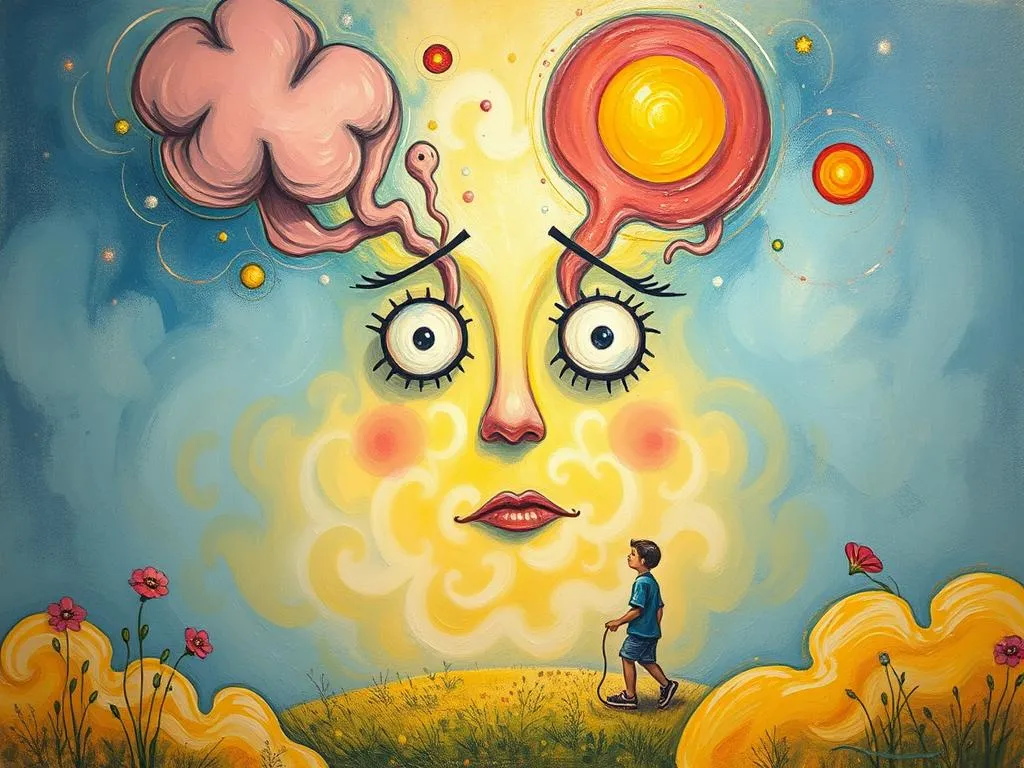
Introduction
Dreams have long fascinated humanity, serving as a window into our subconscious mind. Among the myriad of themes explored in dreams, mental illness stands out as a particularly complex and poignant subject. The intrigue surrounding dreams that touch upon mental illness stems from their ability to reveal hidden aspects of ourselves, our fears, and our emotional struggles. These dreams can act as a mirror, reflecting our internal battles and prompting us to confront issues we may otherwise ignore in our waking lives. As we delve into the symbolism and meanings of these dreams, we uncover a rich tapestry of insights that can help us better understand our mental health and emotional well-being.
Symbolism and Meaning
When we dream about mental illness, a variety of symbols and themes may emerge, each carrying its own significance. Here are some common symbols and their meanings:
- Isolation: Many dreams involving mental illness may present scenarios of isolation, where the dreamer feels cut off from others. This can symbolize feelings of loneliness or a need for self-reflection.
- Disorientation: Dreams that depict confusion or disarray in one’s surroundings can represent a struggle to find clarity or understanding in waking life. This may indicate overwhelming emotions or anxiety.
- Confinement: Being trapped in a small space or a mental institution within a dream can signify feelings of being overwhelmed by one’s thoughts or emotions. It may also represent a fear of losing control over one’s mind.
- Medication or Treatment: Encounters with medication in dreams can symbolize a desire for healing or a need to confront underlying issues. It may also represent one’s current coping mechanisms, whether healthy or unhealthy.
- Transformation: Dreams of change, such as metamorphosis into another being, can signify personal growth or the need to evolve beyond one’s current mental state.
These symbols reflect different perspectives on mental illness—whether they manifest as a personal struggle, societal stigma, or a deeper exploration of identity. Understanding these symbols can provide valuable insights into our emotional state and mental health.
Key Scenarios and Variations
The context of a dream can significantly influence its interpretation. Below are some variations of dreams related to mental illness and how they might change the meaning:
-
Dreaming of being diagnosed with a mental illness: This can represent a fear of vulnerability or a concern about one’s mental state. It may also reflect an internal struggle with self-acceptance.
-
Witnessing someone else with a mental illness: This could symbolize feelings of helplessness or concern for someone close to the dreamer. It may also highlight the dreamer’s own fears and insecurities.
-
Experiencing a mental breakdown: This scenario can indicate that the dreamer feels overwhelmed in their waking life, possibly due to stress or unresolved conflicts. It can also symbolize a need for emotional release.
-
Participating in therapy sessions: Dreams featuring therapeutic settings often indicate a desire for healing or self-improvement. It may reflect a readiness to confront personal issues and seek support.
-
Falling into a deep sleep: This can symbolize a retreat from reality, possibly indicating feelings of burnout or a need for rest. It may also suggest avoidance of addressing deeper emotional issues.
By examining these scenarios closely, dreamers can gain insight into their current mental and emotional states. Recognizing how different contexts alter the meaning of the dream can lead to a deeper understanding of personal challenges.
Real-Life Connections and Takeaways
Connecting our dreams about mental illness to our waking lives is crucial for fostering self-awareness and emotional growth. Here are some insights and practical advice for readers looking to reflect on their dreams:
-
Journaling: Keeping a dream journal can be a powerful tool for self-reflection. Write down your dreams as soon as you wake up, noting any feelings, symbols, or themes that stand out. Over time, patterns may emerge that can guide your understanding of your mental state.
-
Emotional Check-In: After recalling a dream about mental illness, take a moment to assess your feelings. Ask yourself:
- What emotions were present in the dream?
- Do these emotions mirror feelings in your waking life?
-
What aspects of your life might be causing stress or anxiety?
-
Seeking Support: If your dreams evoke strong emotions or raise concerns about your mental health, consider speaking with a mental health professional. They can provide guidance and support in navigating your feelings and experiences.
-
Mindfulness Practices: Incorporate mindfulness or meditation into your daily routine. This can help ground you in the present moment and ease anxiety that may surface from your dreams.
-
Open Conversations: Discuss your dreams with trusted friends or family members. Sharing your experiences can provide additional perspectives and foster deeper connections.
-
Embrace Vulnerability: Recognize that experiencing dreams about mental illness is a natural aspect of being human. Allow yourself to feel vulnerable and explore these feelings without judgment.
By taking these steps, readers can foster a greater understanding of their mental health and emotional landscape. Dreams serve as a powerful tool for introspection, guiding us toward healing and self-discovery.
Conclusion
Dreams about mental illness unveil hidden meanings that can profoundly impact our understanding of ourselves. By exploring the symbolism, variations, and connections to real life, we can glean valuable insights into our emotional struggles and mental health. These dreams remind us of the importance of self-reflection and the need to confront our fears and vulnerabilities.
As you continue to explore your dreams, remember to approach them with curiosity and openness. Embrace the journey of understanding, and allow your subconscious to guide you toward healing and personal growth. In the intricate dance between dreams and reality, we find an opportunity to uncover the deeper layers of our existence, ultimately leading to a richer, more fulfilling life.







